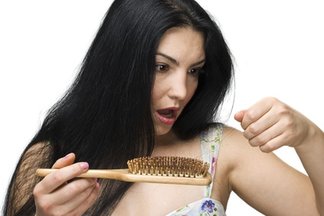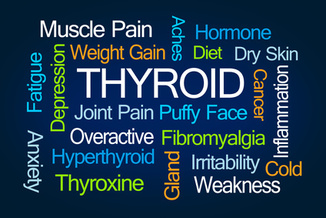As a Holistic Functional Medicine doctor, I explore a broad sweep of the body’s functions looking for the central, underlying problem. Just finding a treatment for the symptom is not enough — the difficulty with hair loss is that it can result from many different issues. Some are treatable and some (at this point in time) are still untreatable. I have to cast a wide net as I check the function of many glands, sugar metabolism, hormone levels, diet and family history.
Some of the issues I investigate:
Excessive Stress
A stressed brain and body is just trying to survive and excessive stress can contribute to hair loss — this is not a good time for growth or reproduction. The adrenal gland makes stress hormones and the pituitary (the master gland), sends strong signals to the adrenal to make more stress hormones. At the same time, stimulation of the thyroid and reproductive organs is dialed down.
Low Thyroid
Hypothyroidism (low thyroid levels) is a common cause of hair loss. Other symptoms are cold hands and feet, constipation, weight gain and loss of the sides of the eyebrows.
There can be problems with the thyroid itself. The most common cause of low thyroid is an autoimmune disease called Hashimoto's Thyroiditis. To rule this out, I check the three thyroid antibody tests available.
In general, if thyroid production is low, the pituitary tries to stimulate the thyroid even more to increase production. Many doctors only measure TSH to assess thyroid production and just measuring TSH alone can be misleading. Under stressful conditions, the pituitary dials down TSH production. The doctor can see a low TSH reading and assume thyroid production is high, when it is actually low. It is very important to measure the full set of thyroid tests at the same time to really understand what is happening with the patient. Low TSH usually indicates high thyroid levels and high TSH usually indicates low thyroid levels (but not always).
Anovulatin and PCOS
Women who are not producing eggs on a regular basis, either because of a hormone imbalance or due to age, can have irregular periods, rising levels of testosterone and other male hormones such as DHEA and androstenedione. Excess male hormones can cause loss of hair from the scalp while stimulating hair growth on the face and other body areas.
Low Estrogen
As women near menopause, estrogen levels can fall. Scalp hair growth and maintenance is supported by estrogen and if there is a loss or reduction in estrogen, hair loss can result.
The high estrogen levels of pregnancy enables individual hair follicles to live longer than usual. After having a baby, the placental estrogens disappear. In addition, breastfeeding suppresses estrogen production. The sudden loss of estrogen can result in a large die off of hair follicles and major hair loss in the months after childbirth.
High Testosterone and Other Male Hormones
In some people, the hair follicles on the top of the head are sensitive to male hormones and stop growing hair in their presence. Those hair follicles can change the strong male hormone, testosterone, into the even stronger male hormone DHT (dihydrotestosterone).
There are several treatment approaches:
• Spironolactone is a medication that was originally used to treat high blood pressure. It blocks testosterone from stimulating the hair follicles.
• Finasteride stops the hair follicle from turning testosterone into DHT.
• Birth control pills can stop the ovaries from producing too much testosterone.
• Diet changes such as eating sugar and other carbohydrates can raise insulin levels. Insulin can stimulate the ovary to make more male hormones. A low carbohydrate diet can help reduce the hair loss.
• Metformin reduces insulin production.
Genetic Male Pattern Baldness
Some people carry a gene that makes their scalp hair very sensitive to male hormones. Their hair follicles turn testosterone into DHT which inhibits hair growth. It is only hair located in certain areas that experience this issue -- thus the male pattern of baldness occurs. The gene is on the X chromosome. Men have only one X, which is inherited from the mother signifying male baldness comes from the maternal side. The mother’s brothers are also an indication. Women have two X’s, one from each parent. They can inherit hair loss from either side or both parents.
Estrogen-Testosterone Ratio
Many menopausal women still make normal female levels of testosterone from their adrenal glands. As estrogen levels fall, the normal testosterone becomes dominant. This can cause hair loss from the top of the head while still stimulating facial hair growth. Estrogen replacement therapy can solve the problem by restoring the normal estrogen-testosterone ratio.
Autoimmune Alopecia
Rarely, some individuals develop an immune condition where antibodies attack the hair follicles and kill them off. This can result in total baldness. There is no current FDA approved treatment that is known to be effective. There are a few individual reports of an intestinal parasite that can affect the immune system resulting with the hair growing back.
Other Causes
Some dietary deficiencies can contribute to hair loss (such as iron deficiency). Vitamin and mineral supplementation should also be considered.


 RSS Feed
RSS Feed